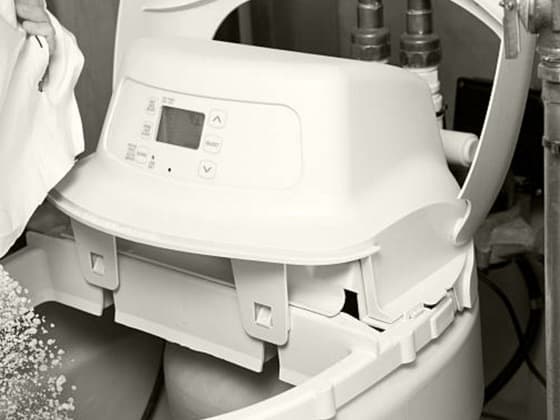Table of Contents
Many homeowners are drawn to the idea of a water softener, desiring to improve the quality of their drinking water or to minimize wear and tear on their pipes and appliances. However, it’s only natural to wonder if installing a water softener could have any unintended consequences. Specifically, can water softeners diminish the flow of water in your house?
The short answer: Water softeners can adversely affect pressure, but only if they are not sized and installed properly. To avoid this fate, consider professional water softener installation in Indianapolis, IN, choosing a highly-experienced company like Carter’s My Plumber.

Is Your Water Softener Really the Problem?
If you are experiencing low pressure in your household, the first step should be troubleshooting. Confirm that the water softener is actually the problem, as in many cases the low pressure may result from another issue altogether.
Start by locating the bypass valve on your water softener, then turning it to the ON position. By doing so, you will divert your water source, ensuring that water does not pass through the water softener before coming through your faucets and other plumbing appliances. So, if you still notice weak water pressure, that indicates that the softener is not the problem.
Instead, you may be facing an issue such as:
- A clogged or corroded pipe.
- A leak in one of your pipes.
- An issue with your municipal water supplier.
Note: If you need further assistance diagnosing water softener problems, don’t hesitate to call an experienced plumber.
Why Do Water Softeners Cause Poor Water Pressure?
If bypassing your water softener restores pressure, that confirms that the problem is indeed with the unit itself. There can be a few different reasons for this:
The Water Softener is Too Small
One of the most common issues is an undersized softener. If your unit does not have the capacity to handle your family’s water supply needs, then you can expect to have chronically low water pressure.
Sometimes, this issue will be immediately evident. If you have a new softener installed and notice a drop in pressure right away, that likely means you’ve chosen the wrong size. But sometimes the problem only becomes evident later on, as your family grows and your water consumption increases.
It’s always important to choose a skilled plumbing company that can provide you with accurate information about water softener sizing, as well as water softener installation cost.
You Have a Clogged Sediment Filter
A decrease in water pressure could also be the result of a blockage in one of your sediment filters. These filters need to be cleaned and replaced regularly, and if they’re not, you may find that particulates get caught in your unit and restrict the flow of water. This can result in low pressure, but a plumbing professional can help you out.
Your Resin Bed is Clogged
Still another potential problem is a clog in your resin bed, usually iron or scale. This can prevent proper regeneration, resulting in a decrease in water pressure. To address this resin issue, you may need to have your resin tank cleaned out. If iron build-up gets to be too bad, you may need to ask about a replacement unit.
You Have Escaped Resin
A drop in water pressure may also be caused by escaped resin, clogging one of your other fixtures. If you notice diminished water flow from a particular faucet or shower head, this is likely the culprit. Cleaning the fixture and flushing the pipes will usually clear things up, restoring healthy water flow.
Conclusion: Diagnosing a Drop in Water Pressure
If your water pressure isn’t what you’d want it to be, there could be any number of mitigating factors, ranging from issues with your city water department to a problem with the water pressure regulator itself. In some situations, your soft water unit may be part of the blame, but this is almost always the result of improper installation or maintenance. A professional plumbing company can always help you diagnose and address water pressure issues.
Frequently Asked Questions
Can my water softener reduce my water pressure and flow rate?
Yes, it could if not sized properly.
How can I know if my water softener is causing low water pressure?
Most softeners today have a flow rate metering device that tells you your flow rate so you’d know if it’s lower than it’s supposed to be.
How do I increase water pressure after water softener installation?
Check for any blockages in the fittings on the unit. There is no way to increase it more than the incoming water pressure coming in through the supply pipe.
How can you tell if your water softener is clogged?
Low water pressure or it’s simply not functioning properly.
What should the pressure be on a water softener?
80 psi is the code in Indiana.
What’s the max water pressure for my water softener?
Max water pressure can vary from manufacturer to manufacturer.



